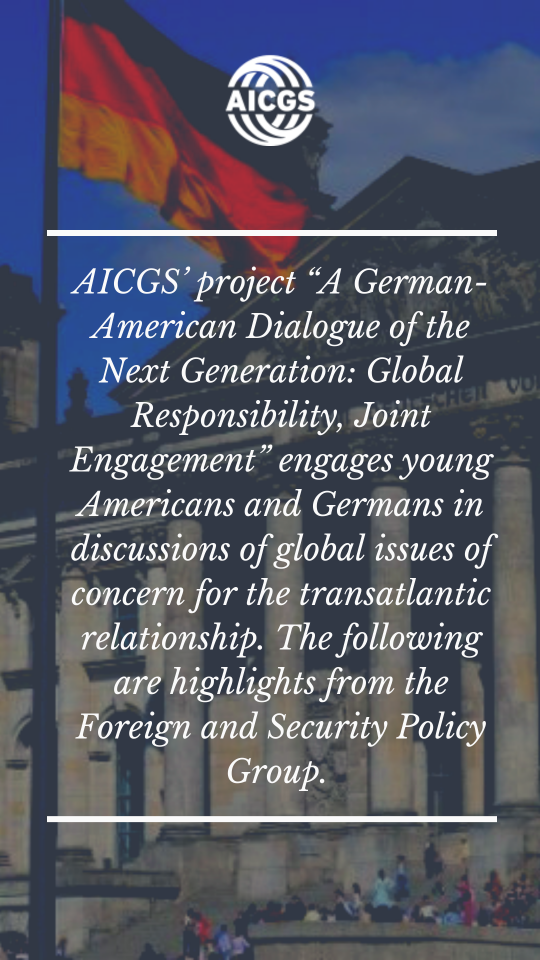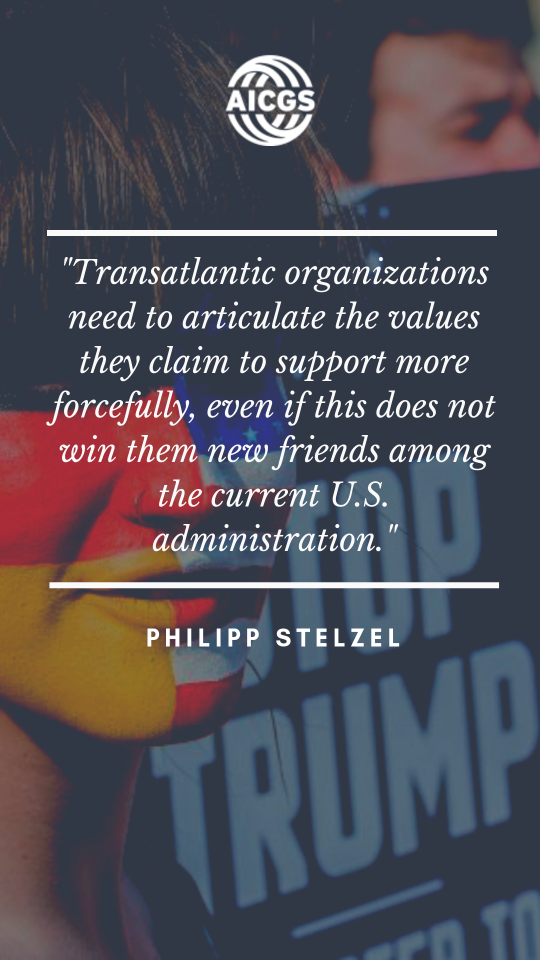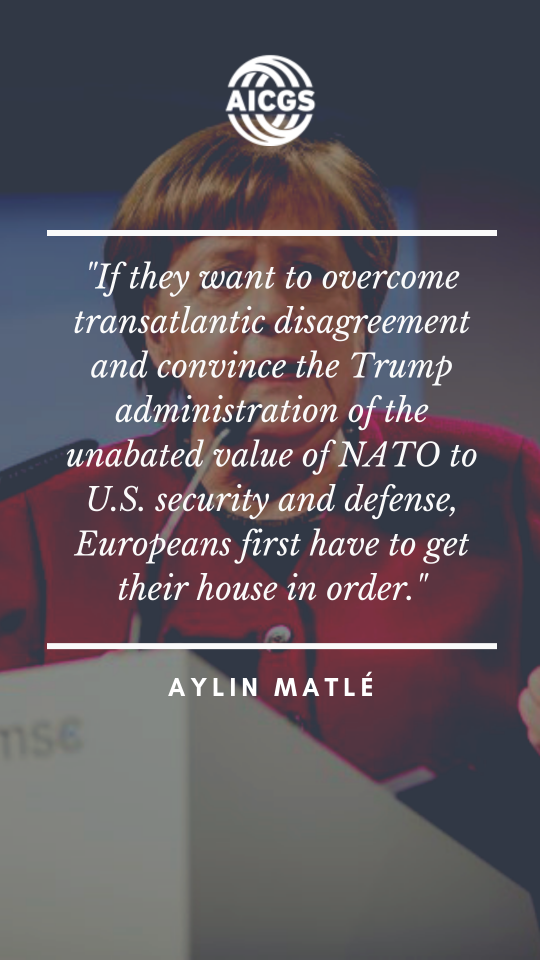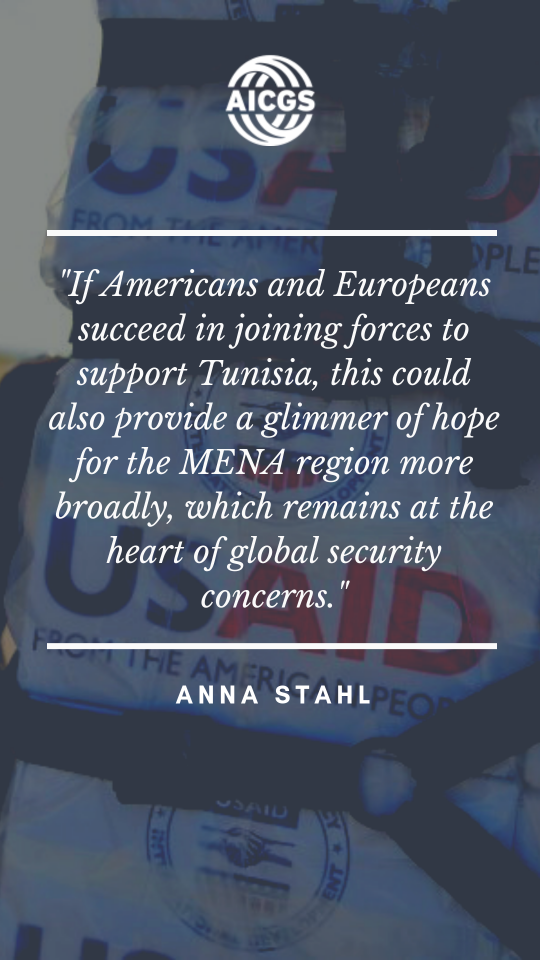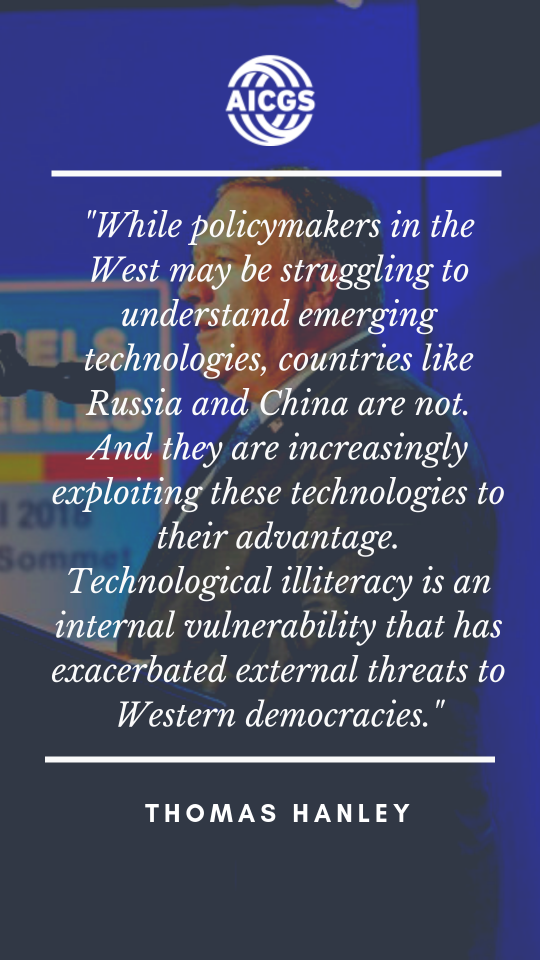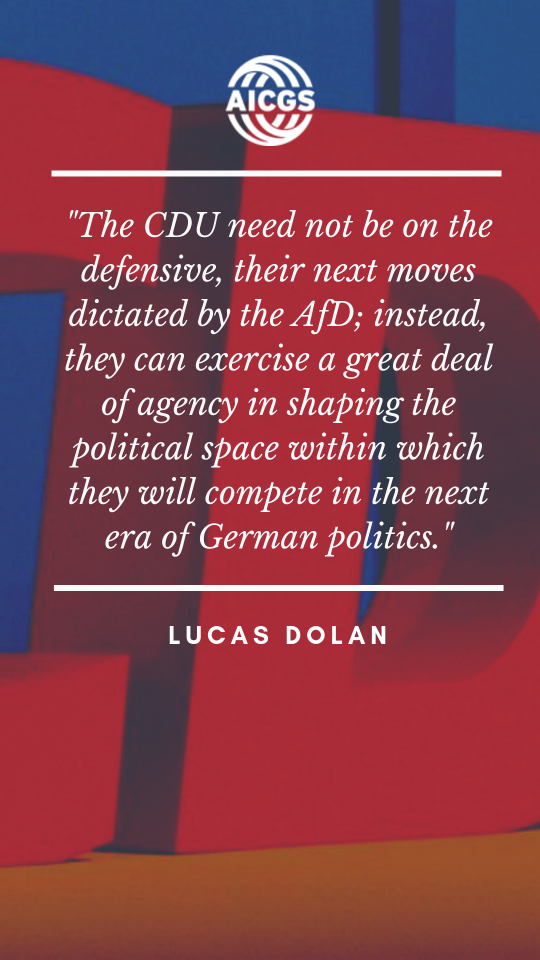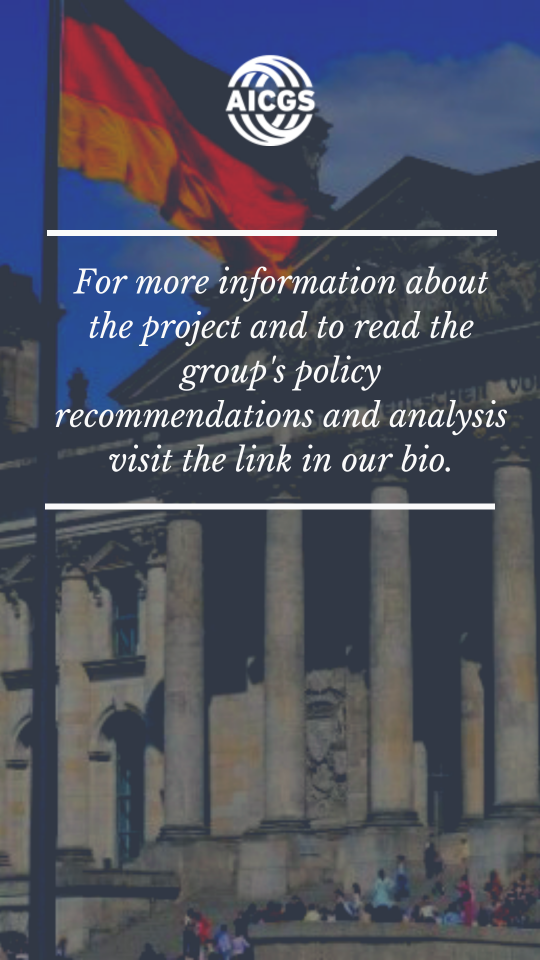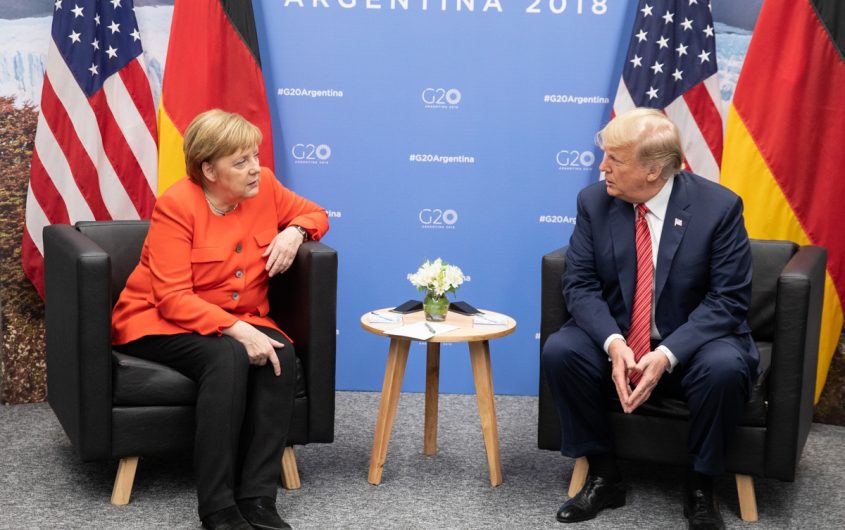
Official White House Photo by Shealah Craighead
Engaging the Next Generation of Transatlantic Leaders

Anna Stahl
Jacques Delors Centre
Dr. Anna Katharina Stahl is a Policy Fellow for European foreign and security policy at the Jacques Delors Centre. Her work focuses on the EU’s relations with China and the United States, as well as geopolitics in Africa and the Middle East. Before joining the Jacques Delors Centre, Anna Stahl was a project director with the Friedrich-Ebert-Stiftung (FES) in Tunisia. Dr. Stahl held research positions in Europe, the United States and Africa with the EU-China Research Centre at the College of Europe, the United States Institute of Peace (USIP), the American Institute for Contemporary German Studies (AICGS), the Institute for European Studies (IES) at the Free University of Brussels and the Centre for Chinese Studies (CCS) at Stellenbosch University.
Anna Stahl obtained a PhD in political science from the Free University of Brussels (VUB) and holds degrees from the College of Europe, the Université Libre de Bruxelles (ULB), the Institute d’Etudes Politiques de Lille and the Westfälische Wilhelms-Universität Münster. She is the author of the book “EU-China-Africa Trilateral Relations in a Multipolar World” (Palgrave Macmillan, 2018).
She is a 2018-2019 participant in AICGS’ project “A German-American Dialogue of the Next Generation: Global Responsibility, Joint Engagement,” sponsored by the Transatlantik-Programm der Bundesrepublik Deutschland aus Mitteln des European Recovery Program (ERP) des Bundesministeriums für Wirtschaft und Energie (BMWi).

Aylin Matlé
German Council on Foreign Relations
Aylin Matlé is a research fellow with the German Council on Foreign Relations. In that role, she primarily works on German security and defense matters. Previously, she has served as the Deputy Head of the Konrad-Adenauer-Stiftung’s Israel office in Jerusalem.
Aylin Matlé holds a PhD from Martin-Luther-Universität Halle-Wittenberg. Her thesis “Drifting Apart of Transatlantic Security: The American Mark on NATO under Barack Obama” examined the impact of the Obama administration on allied and defense policies of European Alliance members. Dr. Matlé worked as a research associate at the chair of international relations and European politics at the Martin-Luther-Universität from 2014-2016. Prior to that, she completed an MA in War Studies at King’s College London in 2014. She holds a bachelor’s degree in Public Management and Governance from Zeppelin Universität, Friedrichshafen.
She was a Fellow in the American-German Situation Room in 2018. In addition, she participated in the AICGS project “A German-American Dialogue of the Next Generation: Global Responsibility, Joint Engagement” from 2018-2019.
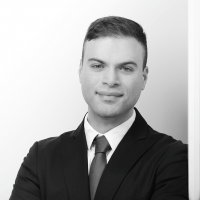
Enes Mert
Edelman
Enes Mert is an Assistant Account Executive at the global communications firm Edelman where he works with the crisis communication and corporate reputation team in the Berlin office. He has received his master’s degree from the University of Edinburgh in International Relations in 2018. Mr Mert holds a bachelor’s degree in Political Science from Free University Berlin and the University of Warwick in Great Britain, where he specialized in foreign policy analysis with a focus on the EU’s foreign policy.
As a German with a Turkish migration background, Mr Mert is strongly engaged in issues dealing with immigration, diversity and civil society in Germany. He was a volunteer at InteGREATer e.V. where he gave regular talks to young students with an immigration background to raise awareness for education. Mr Mert gained work experience as an intern in the German Bundestag, spent two months as an assistant to the chair of the faculty for International Relations at the Middle Eastern Technical University in Ankara, and interned with the communication consultancy WMP Eurocom in Berlin. In 2015, he was a participant at the School of Democracy in Italy, a forum for young leaders organized by the S&D Faction in the European Parliament. Recently, he took part in the 2017-2018 AICGS Transatlantic Exchange Program for Young Minorities in Washington, DC, and Berlin.
He is a 2018-2019 participant in AICGS’ project “A German-American Dialogue of the Next Generation: Global Responsibility, Joint Engagement,” sponsored by the Transatlantik-Programm der Bundesrepublik Deutschland aus Mitteln des European Recovery Program (ERP) des Bundesministeriums für Wirtschaft und Energie (BMWi).
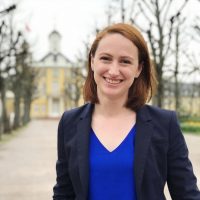
Heidi Obermeyer
CTIA - The Wireless Association
Heidi Obermeyer is the Policy and Communications Manager at CTIA - The Wireless Association. She was a 2017/2018 Alexander von Humboldt Foundation German Chancellor Fellow at the German Council on Foreign Relations (DGAP e.V.) conducting research on German foreign policy and transatlantic relations. Prior to joining DGAP, she was a Fellow and Program Coordinator at the Center for Transatlantic Relations at Johns Hopkins University SAIS. She has worked for the Department of State at the U.S. Embassy in Berlin, for the U.S. Commercial Service in Munich, and in federal consulting in the Department of Veterans Affairs. She holds an MA in Political Science with a concentration in European Governance from the University of North Carolina at Chapel Hill and a BA in International Affairs, Germanic Studies, and Anthropology from the University of Colorado at Boulder.
She is a 2018-2019 participant in AICGS’ project “A German-American Dialogue of the Next Generation: Global Responsibility, Joint Engagement,” sponsored by the Transatlantik-Programm der Bundesrepublik Deutschland aus Mitteln des European Recovery Program (ERP) des Bundesministeriums für Wirtschaft und Energie (BMWi).
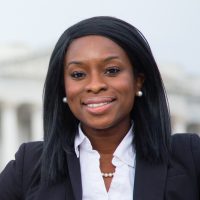
Laura Kupe
RAND Corporation
Laura Kupe is a Policy Analyst at the RAND Corporation. She currently serves as a Transatlantic Expert Group Leader for the Truman National Security Project and a Youth Ambassador for Women of Color Advancing Peace, Security, and Conflict Transformation. Ms. Kupe previously served as a Special Assistant at the Department of Homeland Security (DHS) in the Office of International Engagement within the Office of Policy as a presidential appointee in the Obama administration. In her role, she served as a subject-matter expert on the Department’s engagement with European Union (EU) member states and the Five Eyes on topics including immigration/migration, border security, and counterterrorism. Previously, she was detailed to the Office of Presidential Personnel in the White House and served as Domestic Director. Before her detail, she served as the Briefing Book Coordinator to DHS Secretary Jeh Johnson. Prior to her time in the federal government, Ms. Kupe served as a legislative fellow for Congresswoman Karen Bass, Ranking Member of the Africa Subcommittee on the House Foreign Affairs Committee. Her parents are originally from the Democratic Republic of Congo, and she was born in Germany and raised in Luxembourg before moving to the United States. Ms. Kupe speaks fluent German and is a self-proclaimed “Afropean-American.” She graduated with a BA from the University of Michigan and a JD from the University of Michigan Law School.
She is a 2018-2019 participant in AICGS’ project “A German-American Dialogue of the Next Generation: Global Responsibility, Joint Engagement,” sponsored by the Transatlantik-Programm der Bundesrepublik Deutschland aus Mitteln des European Recovery Program (ERP) des Bundesministeriums für Wirtschaft und Energie (BMWi).

Lucas Dolan
American University
Lucas Dolan is a PhD Candidate at American University’s School of International Service. His research is broadly concerned with the role of transnational activist networks in reshaping international order. In his current research project, he examines the emergence of a transnational right-wing populist movement and its influence in German and American domestic politics. His commentary on populist politics has appeared in Duck of Minerva and The New York Times.
Mr. Dolan learned German as a Kathryn Davis Fellow for Peace at the prestigious Middlebury College Summer Language Schools. He studied network analysis at the Inter-University Consortium for Political and Social Research (ICPSR) Summer Program, an internationally recognized quantitative methods program. Before starting graduate school, he worked as an intern at the U.S. Embassy in Berlin.
He is a 2018-2019 participant in AICGS’ project “A German-American Dialogue of the Next Generation: Global Responsibility, Joint Engagement,” sponsored by the Transatlantik-Programm der Bundesrepublik Deutschland aus Mitteln des European Recovery Program (ERP) des Bundesministeriums für Wirtschaft und Energie (BMWi).

Philipp Stelzel
Duquesne University
Philipp Stelzel studied modern European and German history at Ludwig-Maximilians-Universität München, Columbia University (MA), and the University of North Carolina at Chapel Hill (PhD). He has taught at Duke University, Boston College, and has been assistant professor of history at Duquesne University, Pittsburgh, since 2014.
His research focuses on post-1945 German and German-American intellectual and political history, historiography, and transnational history. His first book, History after Hitler: a Transatlantic Enterprise (Intellectual History of the Modern Age series of University of Pennsylvania Press, 2018) analyzes the intellectual exchange between German and American historians of modern Germany from the end of World War II to the 1980s.
His current project, Oppressing the Majority, is a contribution to the history of the global phenomenon of populism. It explores the trajectory of an argument that simultaneously emerged in Western Europe and the United States in the late 1960s and early 1970s, namely that a number of different actors, including political elites, activists, and the media, oppressed the voices of the "silent majority" of the respective populations. Oppressing the Majority follows the argument's trajectory in West Germany, Great Britain, and the United States in the subsequent four decades and places it in the political, socio-economic, and cultural context of these countries.
He is a 2018-2019 participant in AICGS’ project “A German-American Dialogue of the Next Generation: Global Responsibility, Joint Engagement,” sponsored by the Transatlantik-Programm der Bundesrepublik Deutschland aus Mitteln des European Recovery Program (ERP) des Bundesministeriums für Wirtschaft und Energie (BMWi).
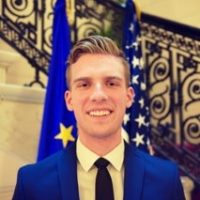
Thomas Hanley
Global Public Policy Institute
Thomas Hanley is a research assistant with the Global Public Policy Institute (GPPi) in Berlin, where he provides research and project support to the institute’s work on multilateral coalition building, the changing global order, technological sovereignty issues, and authoritarian challenges to liberal democracies. During the 2017-2018 academic year, Mr. Hanley taught at the Catholic University of Eichstätt-Ingolstadt as a graduate assistant, and was an Atlantic Expedition Fellow with the Berlin-based Atlantische Initiative, an organization working to improve transatlantic relations.
Mr. Hanley holds a Bachelor’s degree in political science from Boston College, where his thesis examined the relationship between European radical right-wing parties and xenophobic violence. He speaks English and German, and has previous work experience with the United States Department of State in Brussels, Belgium and with R/GA Digital Advertising, working on its Nike account in London, England.
He is a 2018-2019 participant in AICGS’ project “A German-American Dialogue of the Next Generation: Global Responsibility, Joint Engagement,” sponsored by the Transatlantik-Programm der Bundesrepublik Deutschland aus Mitteln des European Recovery Program (ERP) des Bundesministeriums für Wirtschaft und Energie (BMWi).
Foreign & Domestic Policy Recommendations
During the course of the 2018-2019 project “A German-American Dialogue of the Next Generation: Global Responsibility, Joint Engagement,” the Foreign & Domestic Policy Group focused on trust building, responding to the populist challenge, reflecting on the state of transatlantic security, and responding to China and the problems surrounding technology. To begin, they recommend (re-)building trust as a course of action for strengthening the transatlantic relationship. This would mean engaging multidisciplinary stakeholders for inclusive dialogue to deepen relations between civil societies and states in both countries. The group also recommended that populism needs to be redefined more precisely, distinguishing between anti-elitist populism and anti-pluralist populism. In doing so, it was noted that the dialogue facing the populist challenge should be shifted to be more inclusive. The group then reflected on transatlantic security and the difference between operational and strategic autonomy. Germany should strengthen its own capabilities to share the burden in NATO, so that the alliance does not have to rely on the U.S. for resources. Finally, the group recommended focusing on the China challenge, noting the importance of bridging the technology gaps in both Germany and the United States. There should be consistency in China policies for both Europe and the United States, and this should incorporate a focus on investment controls.
Their recommendations were originally presented on Instagram.



